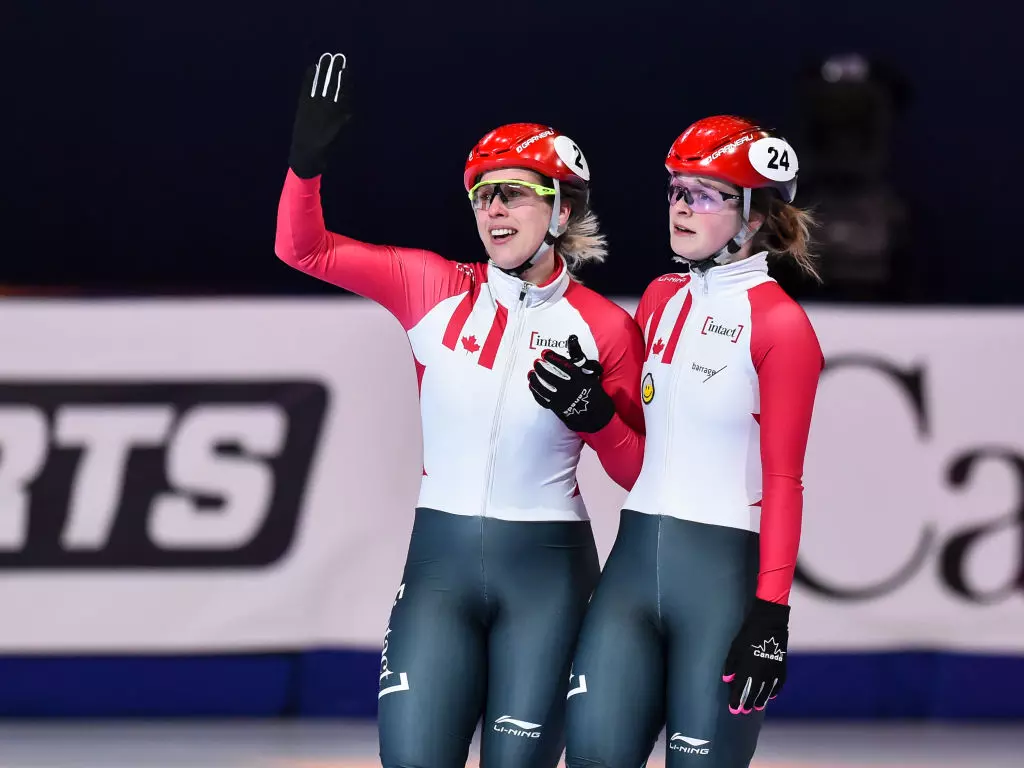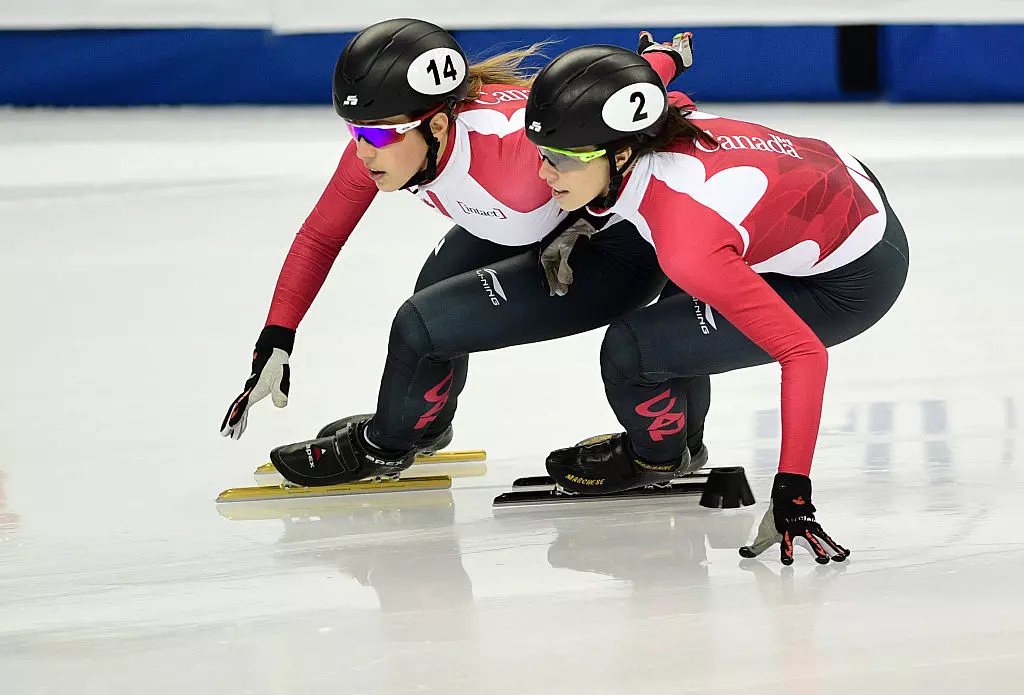#WCShortTrack #OneHandDown
Camille de Serres-Rainville remembers being a wide-eyed 14-year-old, watching on her living room television, when Marianne St-Gelais captivated a nation by winning the first of her three Olympic medals at the Vancouver 2010 Olympic Winter Games.
“She was so young but she just had this incredible will to win,” says De Serres-Rainville, now 23, who is competing in her first World Cup event at the Calgary Olympic Oval this weekend. “She just seemed to want it more than the others. And of course, my main memory of that Olympics is that kiss with Charles.”
__Marianne__St-Gelais(CAN)__2018%C2%A9International__Skating__Union(ISU)-933725808.webp)
Charles HamelinHamelin (CAN) and Marianne St-Gelais (CAN) 2018©International Skating Union (ISU)
De Serres-Rainville is referring to the famously intimate moment shared by St-Gelais and her then boyfriend Charles Hamelin, just after he won gold in the Men’s 500m. “Everyone remembers that,” she says. “It showed that despite being athletes, they were still just these normal human beings who were in love. Watching them just inspired me. She was this big personality, and through that she’s been such a role model for young female (Short Track) Speed Skaters in Canada. She really changed the sport over here, being on top for ten years. I was looking at her growing up and just wanting to be her.”
Eight years on, St-Gelais is now retired, calling time on a glittering career back in May. With fellow Canadian Short Track icon Kim Boutin – who won three medals at PyeongChang 2018 – skipping this weekend’s World Cup, and Sochi 2014 silver medalist Valerie Maltais embarking on a new career racing on the long track, there’s a changing-of-the-guard feeling about the Canadian Ladies’ team in Calgary.

Marianne St-Gelais and Kim Boutin (CAN) 2018©International Skating Union (ISU)
“It feels really different,” De Serres-Rainville says. “All of those really experienced girls suddenly not being around, it’s a little bit weird.”
But while the pressure of trying to fill the boots of Boutin, Maltais and St-Gelais may be daunting, Canada’s young skaters are also seeing it as an opportunity. “It’s kind of a big season for the rookies,” says 18-year-old Courtney Lee SaraultLee Sarault, who is also making her World Cup debut in Calgary. “Marianne’s always been my idol but now she’s not competing any more and it’s suddenly like, ‘OK, now it’s our time to represent the country at the highest level.’ But it’s the biggest challenge we’ve faced yet.”
2017%C2%A9International__Skating__Union(ISU)-633029398.webp)
Courtney Lee Sarault (CAN)2016©International Skating Union (ISU)
Sarault is one of Canada’s brightest young Short Track prospects, winning a gold and a silver medal at the World Junior Short Track Championships in Poland in March. But the step up from Junior competition to facing the world’s elite is proving challenging. As her opening 1500m race in Calgary was about to get underway, she suddenly felt a little overawed.
“It’s nerve-racking,” she says. “I didn’t think the nerves would get to me. I thought I was fine. I was on the ice, I was ready, I was determined. And then right when we were going to the line, my legs turned numb. My whole body was just numb.”
align center
However, support is not far away. While St-Gelais is not in Calgary, she still remains heavily involved in Canadian Short Track. Along with Boutin and Maltais, she provides regular advice for the inexperienced skaters, as they attempt to transition to racing the best in the world.
“They’re always there to help us and guide us when we have questions, and when we do something wrong,” Sarault says. “For me, I still need some help with my technique so they’ll just help me out a bit. During training, if our attitude’s low, Kim’s always there to pat us on the back, hype us up and get us ready.”
Not all of the challenges have been directly associated with skating. For Sarault, and 21-year-old Alison Desmarais – another World Cup debutant in Calgary – making it to the Canadian national team has come with plenty of personal sacrifices, moving away from their friends and families to pursue their skating dreams.

Valerie Maltais and Marianne St-Gelais (CAN) ©JOHANNES EISELE/AFP/Getty Images
“I’m from a really small town called Vanderhoof which has just a few thousand people,” Desmarais says. “But this means you have to leave to get the next-level training opportunities, and leave your support network behind. I moved to Calgary to train when I was 16, which was hard. I was very homesick for a few months but the older skaters in our training groups have always been there to help us with that.”
align center
Now moving on to the World Cup stage, the biggest challenge for Canada’s young skaters will be adapting to the psychological demands of a fast-paced and often brutal sport, with races frequently won and lost at the highest level by a matter of millimeters. “It’s been a little bit of a shock today,” says De Serres-Rainville, after going out in the quarter-finals of the 1500m. “I thought the girls would be strong but they’re actually even stronger. It all goes really, really fast, much faster than at national level. You’re watching them on the outside, and you’re trying to decide, ‘Should I block her, should I move in front, should I stay put?’ But by that point they’re already in front and gone, and you’re like, ‘Woah’.”
__2017%C2%A9International__Skating__Union__(ISU)-878865610.webp)
Camille de Serres-Rainville (CAN) 2017©International Skating Union (ISU)
For inexperienced skaters, racing the athlete next to them, rather than their reputation, can be a large part of the challenge. It’s one which De Serres-Rainville admits she still needs to work on. “All the girls we’re skating against at the World Cups went to the Olympic Games,” she says. “Last year, I was watching them on my computer, so it’s kind of hard not to be impressed by them, and instead just treat them as normal human beings. That’s the difficult bit, forgetting that they’re Olympic or World medalists, and so I do end up doubting myself a little, even though I shouldn’t. Marianne and Valerie keep telling me to believe in myself because they know what I’m capable of, even more than I do.”
However, while all the young Canadian skaters agree that while the results may not come instantly, this year’s World Cup series will provide them with vital experience on the road to Beijing 2022 and their ultimate goals of emulating their mentors on the Olympic stage.
“Right now, I’m really in the learning phase, learning how skate against these girls,” De Serres-Rainville says. “Valerie’s helping me a lot with what I can do better, trying to analyze my races so that when I make mistakes, I don’t repeat them. I think I’ll get better, the more races I do. You always race to win, but right now I’m more racing to learn. I’m not really in the phase where I’m thinking, ‘I want to win every race I can’. But it’ll come.”